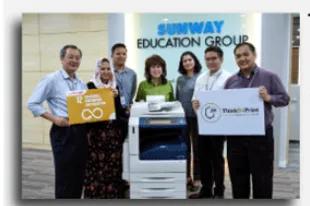The ThinkB4Print campaign
Launched in April 2019, the ThinkB4Print campaign was launched to create awareness and to encourage all Sunway Staff and Students to save paper out of concern for the environment.
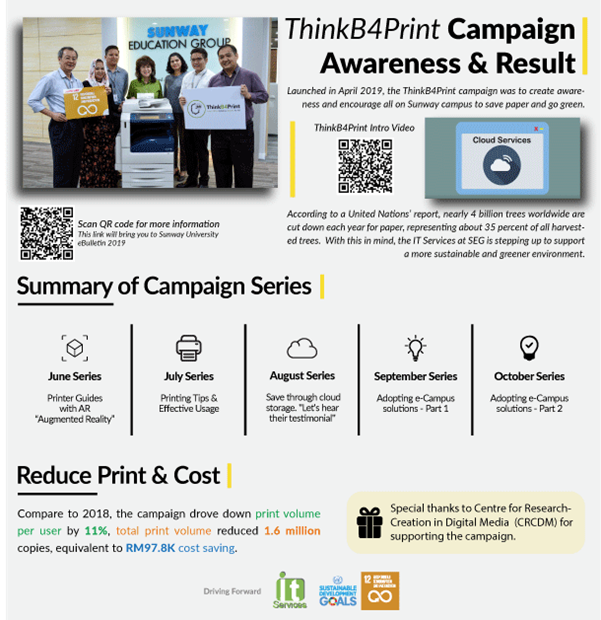
Paper production has a direct correlation with deforestation. Despite availability of recycled paper, paper manufacturing uses mainly virgin materials (State of the Global Paper Industry 2018). The world’s forests are on the decline. Over the years 2010 – 2015, according to the United Nations Food and Agriculture Organisation (FAO) there was an annual forest cover nett change of negative 3.2 million hectares (FAO 2016). This includes trees cut down for paper production as the FAO definition of forests includes timber plantations.
A reduction in the amount of paper used by Sunway Education Group demonstrates its alignment with global issues concerning climate change. The private sector can align its business activities with responsible consumption because deforestation is the second-leading cause of climate change after fossil fuel burning (FAO 2018).
The ThinkB4Print campaign encouraged the reduction of paper consumption. This move further strengthened SEG’s commitment to the United Nations Sustainable Development Goals (UNSDGs), particularly SDG number 12 - Responsible Consumption and Production.
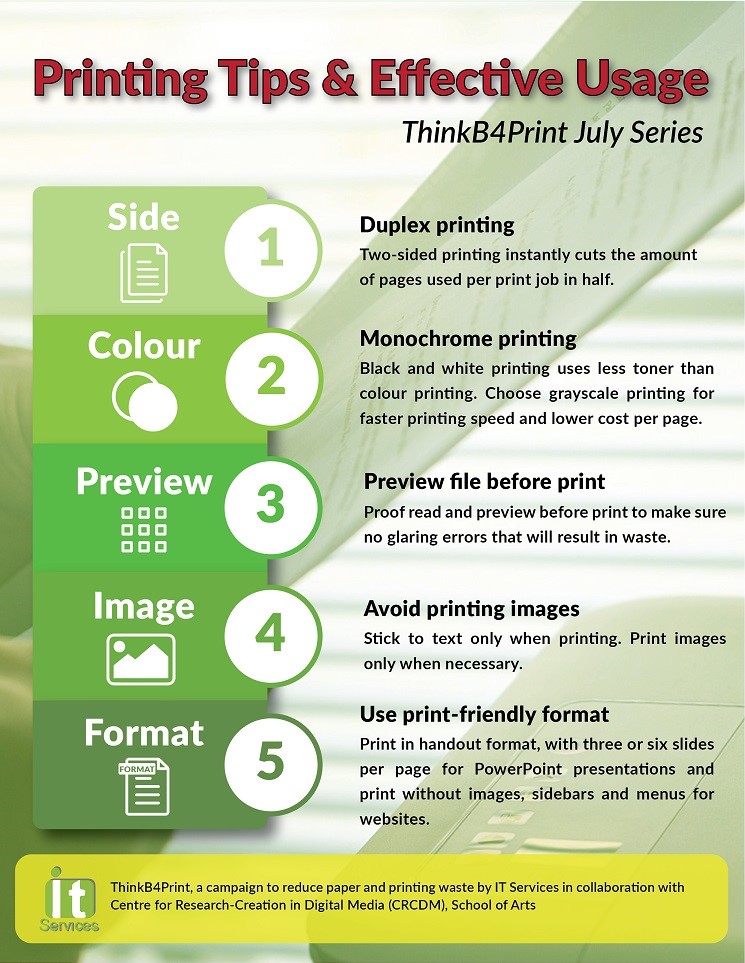
"We have very good printing facilities on campus, and we have made it easy for our users to print. At the same time, we are also very conscious of the huge cost to our planet. I would like to think that as our campus workplace becomes more mature, our colleagues and students will make conscious choices to print less and chose various digital alternatives instead,” said Tony Lee, Chief Information Officer, SEG.
The ThinkB4Print campaign was designed to enable a variety of paper-saving practices to reach targeted audiences using multimodal approaches. The campaign was the outcome of six months of preparation by both the IT Services of Sunway Education Group (SEG) and the School of Arts-Centre for Research Creation in Digital Media (SOA-CRCDM).
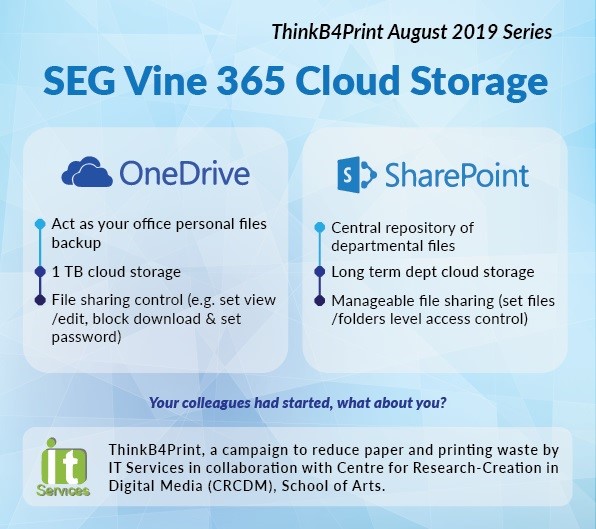
Making use of original video content and augmented reality (AR), the campaign started off in June 2019 with both a roadmap and ecofriendly printing guides interspersed together with a series of alternative solutions. Content was delivered over the course of five months to ease users into new printing and paper-saving habits. The series includes a video awareness campaign featuring printing tips and effective printer usage; transitioning towards cloud storage and adopting e-Campus solutions to event and administrative tasks. All campus staff were encouraged to participate in the campaign to reduce paper consumption with the long term goal of reduced paper found in the office.
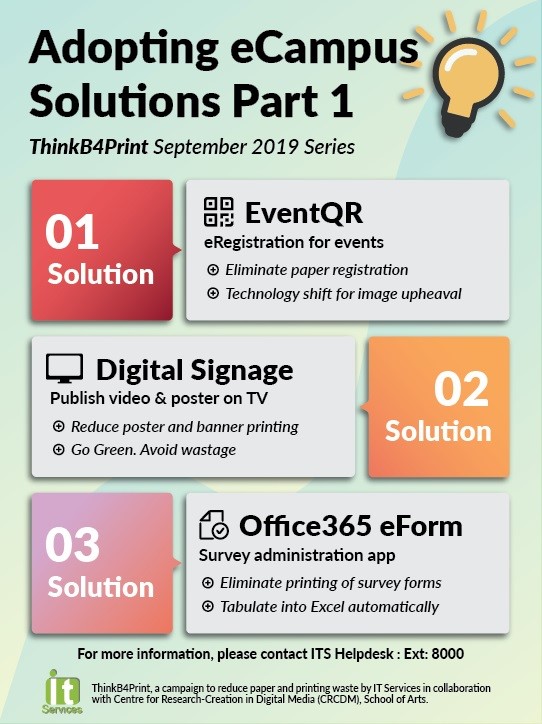
The campaign strategically placed information tents at all University printer terminals (see photo below) to remind users to practice diligent paper usage. Integrating the campaign messages into existing IT assets in each department enhanced the campaign’s presence across campus. Each of these tents blended IT technical help with user education on reduced-paper printing practices and sustainability awareness. Operating within the nexus of the physical and the virtual space, the campaign went one step further to encourage uptake of AR technology as the primary means of accessing the technical and user education material.
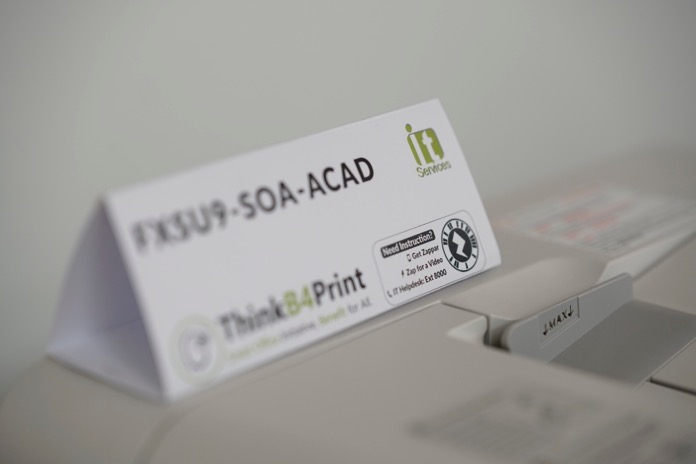
SEG Printer Terminals were refitted with campaign information to encourage sustainable paper consumption
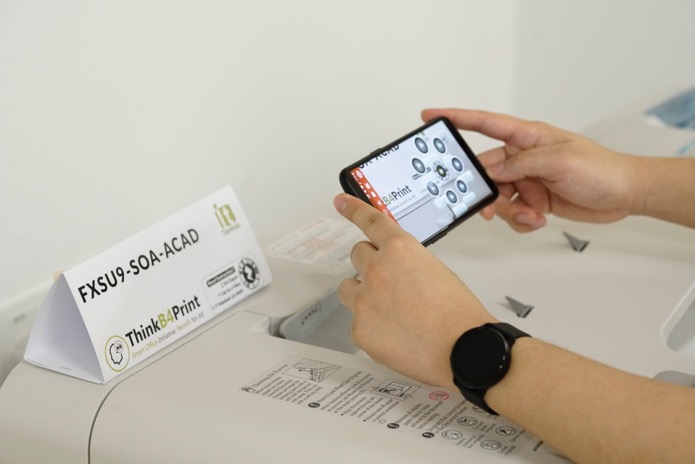
Staff and Students accessed additional information on deforestation and reduced printing practices
Supporting the campaign was Dr Elizabeth Lee, Chief Executive Officer of SEG. “At any organisation or institution such as ours, the consumption of paper for printing is extremely high. In this digital age, let us all strive to reduce paper consumption and move towards a paperless community, to reduce our carbon footprint.”
Despite improvements in energy optimization for reduced GHG emissions, the paper and pulp industry remains a high energy consuming and polluting sector. Particularly polluting is the pulping process, a core component of paper making, which requires chemicals (such as chlorine for bleaching) to process timber into pulp for final processing into paper. Wastewater and gaseous pollutants from these processes left untreated enter waterways and the atmosphere. In other words, paper production results in air, land and water pollutants while reducing forest cover. With these environmental impacts in mind, the outcomes of this campaign are in line with efforts to prevent environmental damage and to reduce global carbon footprint.
In her ThinkB4Print Campaign Video Message Dr Lee urged all SEG users “to reduce paper consumption and move towards a paperless community by practicing ‘Thinkb4Print-ing and adopting the e-Campus solutions that are being introduced by our IT Services.”
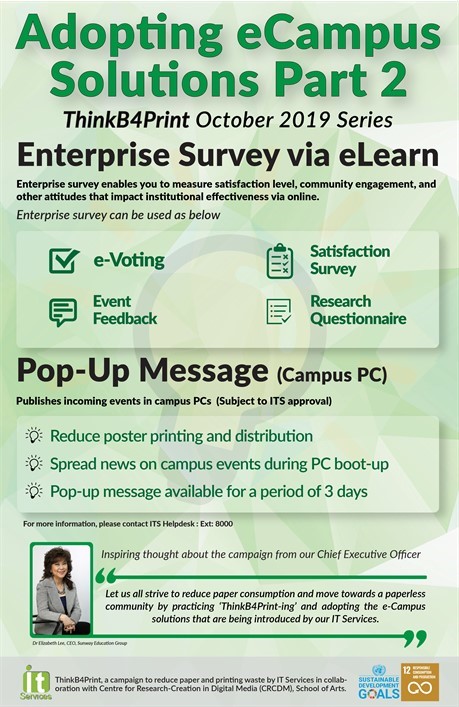
The ThinkB4Print campaign is a joint effort between IT Services and the School of Arts-Centre for Research Creation in Digital Media (SOA-CRCDM). It was supported by Branding and Corporate Communication, the Australian Matriculation (AUSMAT) Programme at Sunway College and the Centre for English Language Studies (CELS). Key members of the ThinkB4Print campaign include Loo Ooi Meng, Manager; Ong Kiat Ming, Section Head, and Wong Jian Xiang, IT Executive from IT Services, and Delas Santano, Audiovisual Producer, Centre for Research-Creation in Digital Media, School of Arts, Sunway University.
The campaigns ended in October 2019 with the continued hope that all on the Sunway campus continue efforts to reduce paper consumption.
References:
- MacDicken, K., Jonsson, Ö., Piña, L., Maulo, S., Contessa, V., Adikari, Y., ... & D’Annunzio, R. (2016). Global forest resources assessment 2015: how are the world's forests changing?.
- FAO, F. (2018). The State of the World’s Forests 2018‐Forest pathways to sustainable development.
- Haggith, M., Kinsella, S., Baffoni, S., Anderson, P., Ford, J., Leithe, R., ... & Tinhout, B. (2018). The State of the Global Paper Industry 2018.
- Wang, Y., Yang, X., Sun, M., Ma, L., Li, X., & Shi, L. (2016). Estimating carbon emissions from the pulp and paper industry: A case study. Applied Energy, 184, 779-789.



